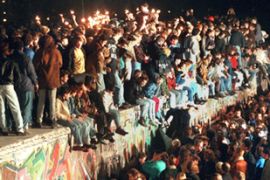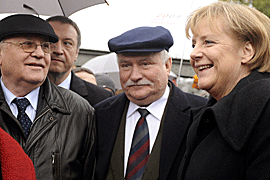Berlin celebrates fall of wall
World leaders gather to mark 20th anniversary of events that led to reunification.

“We must tackle this problem if we want to achieve equal quality of life [in east and west],” she told ARD public television on Monday.
| Special report |
|
|
Following the ceremony Merkel and Mikhail Gorbachev, the ex-Soviet leader, walked through the Bornholmer Strasse crossing – a former border where hundreds of East Germans rushed past 20 years ago.
Merkel, who grew up in East Germany and was one of thousands to cross that night, recalled that “before the joy of freedom came, many people suffered.”
She told Gobrachev, who is known for his role in pushing reform in the Soviet Union, that “we always knew that something had to happen there so that more could change here”.
“You made this possible – you courageously let things happen, and that was much more than we could expect,” she said.
Colourful events
Thousands of people have poured into the capital to mark the anniversary of the event on November 9, 1989, which led to the reunification of Germany and paved the way for the collapse of the Soviet Union.
 |
| Merkel (right), Gorbachev (middle) and Walesa (left) marked the anniversary [AFP] |
Merkel will be joined throughout the day by pivotal figures from the era that ushered in the collapse of communism in Eastern Europe as commemorative events around the once-divided city continue throughout Monday.
They include Lech Walesa, who led anti-communist protests in Poland as the head of the Solidarity trade union, and
former dissidents.
Gordon Brown, the British prime minister, Nicolas Sarkozy, the French president, Dmitry Medvedev, his Russian counterpart, and Hillary Clinton, the US secretary of state, will also attend – representing the four nations which occupied post-war Germany.
The day’s celebrations will include the toppling of 1,000 giant, brightly coloured dominoes along a 1.5km-stretch of the wall’s original path, to symbolise how communist governments in the Eastern Bloc fell one after another in 1989.
Memorials are also planned to the 136 people killed trying to cross the
border, and a concert featuring performances from Bon Jovi and the Staats kapelle orchestra are expected later on Monday.
Merkel, who was working as a scientific researcher in East Berlin 20 years ago, has called the fall of the Wall “the happiest day in recent Germany history”.
Al Jazeera’s David Chater, reporting from Berlin, said there was a real sense of celebration in the air.
“But it is nothing like that feeling on the streets on that day in particular, because it marked the end of communism itself.”
Sore point
But for some German residents, the 1990 reunification of the country remains a sore point.
| In video |
|
|
On Saturday, several hundred leftist demonstrators protested against the planned celebrations in Berlin.
A poll of more than 1,000 Germans carried out for the Leipziger Volkszeitung newspaper showed one in eight wanted the wall rebuilt – with the numbers nearly equal in the eastern and western parts of the now-unified country.
Shaken by the mass flight of its citizens into capitalist West Berlin, East Germany began erecting its “anti-fascist protection barrier” in the early hours of August 13, 1961.
According to a study published this year, at least 136 people were killed at the Berlin Wall between 1961 and 1989 while trying to escape.
However, thousands managed to evade the minefields, dogs and guards in watchtowers, using schemes including tunnels, aerial wires and hidden compartments in cars in order to make it to the West.

